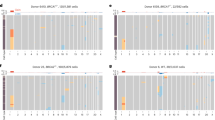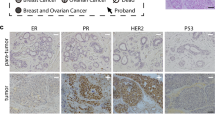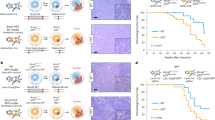Abstract
The structure and expression of the human Rad53 homologue Chk2 was analysed in breast cancer. The previously described silent polymorphism at nucleotide 252 in codon 84 (GAA>GAG) was observed in 5/141 cases. Somatic Chk2 coding mutations were detected in 7/141 cases, these occurring in 4/18 BRCA1-associated breast cancers, 1/78 sporadic breast cancers and 2/25 typical medullary carcinomas. Each of the BRCA1-associated cancers with Chk2 mutations also contained mutations in p53, whereas the single sporadic cancer with Chk2 mutation was wild-type for p53. Expression of Chk2 was ubiquitously detected in normal ductal epithelium of the breast, but there was loss of expression in a significant proportion of breast carcinomas, and this occurred in cancers both with and without p53 mutation. A CpG island was identified 5′ of the Chk2 transcriptional start site, but there was no evidence of cytosine methylation in any of the cancers with down-regulated Chk2 expression. Analysis of the germ-line of 45 individuals with hereditary or early onset breast cancer revealed wild-type Chk2 sequence in all cases. Thus, despite the rarity of somatic mutations in Chk2 in sporadic breast carcinomas, our results nevertheless reveal that concomitant loss of function in Chk2 (via down-regulation of expression) and p53 (via mutation) occurs in a proportion of sporadic cases. However, consistent with other studies, we show that germ-line mutations in Chk2 are unlikely to account for a significant proportion of non BRCA1-, non BRCA2-associated hereditary breast cancers.
This is a preview of subscription content, access via your institution
Access options
Subscribe to this journal
Receive 50 print issues and online access
We are sorry, but there is no personal subscription option available for your country.
Buy this article
- Purchase on SpringerLink
- Instant access to full article PDF
Prices may be subject to local taxes which are calculated during checkout




Similar content being viewed by others
References
Acquati F, Morelli C, Cinquetti R, Bianchi MG, Porrini D, Varesco L, Gismondi V, Rocchetti R, Talevi S, Possati L, Magnanini C, Tibilett MG, Bernasconi B, Daidone MG, Shridhar V, Smith DI, Negrini M, Barbanti-Brodano G, Taramelli R . 2001 Oncogene 20: 980–988
Allinen M, Huusko P, Mantyniemi S, Launonen V, Winqvist R . 2001 Br. J. Cancer 85: 209–212
Banelli B, Casciano I, Romani M . 2000 Oncogene 19: 4553–4556
Bartkova J, Falck J, Rajpert-De Meyts E, Skakkebaek NE, Lukas J, Bartek J . 2001 Oncogene 20: 5897–5902
Bell DW, Varley JM, Szydlo TE, Kang DH, Wahrer DC, Shannon KE, Lubratovich M, Verselis SJ, Isselbacher KJ, Fraumeni JF, Birch JM, Li FP, Garber JE, Haber DA . 1999 Science 286: 2528–2531
Brooks LA, Tidy JA, Gusterson B, Hiller L, O'Nions J, Gasco M, Marin MC, Farrell PJ, Kaelin WG Jr, Crook T . 2000 Cancer Res. 60: 6875–6877
Chehab NH, Malikzay A, Appel M, Halazonetis TD . 2000 Genes Dev. 14: 278–288
de Cremoux P, Salomon AV, Liva S, Dendale R, Bouchind'homme B, Martin E, Sastre-Garau X, Magdelenat H, Fourquet A, Soussi T . 1999 J. Natl. Cancer Inst. 91: 641–643
Crook T, Crossland S, Crompton MR, Osin P, Gusterson BA . 1997 Lancet 350: 638–639
Crook T, Brooks LA, Crossland S, Osin P, Barker KT, Waller J, Philp E, Smith PD, Yulug I, Peto J, Parker G, Allday MJ, Crompton MR, Gusterson BA . 1998 Oncogene 17: 1681–1689
Detre S, Saclani Jotti G, Dowsett M . 1995 J. Clin. Pathol. 48: 876–878
Eisinger F, Jacquemier J, Charpin C, Stoppa-Lyonnet D, Bressac-de Paillerets B, Peyrat JP, Longy M, Guinebretiere JM, Sauvan R, Noguchi T, Birnbaum D, Sobol H . 1998 Cancer Res. 58: 1588–1592
Esteller M, Silva JM, Dominguez G, Bonilla F, Matias-Guiu X, Lerma E, Bussaglia E, Prat J, Harkes IC, Repasky EA, Gabrielson E, Schutte M, Baylin SB, Herman JG . 2000 J. Natl. Cancer Inst. 92: 515–517
Falck J, Lukas C, Protopopova M, Lukas J, Selivanova G, Bartek J . 2001 Oncogene 20: 5503–5510
Greenblatt MS, Chappuis PO, Bond JP, Hamel N, Foulkes WD . 2001 Cancer Res. 61: 4092–4097
Haruki N, Saito H, Tatematsu Y, Konishi H, Harano T, Masuda A, Osada H, Fujii Y, Takahashi T . 2000 Cancer Res. 60: 4689–4692
Herman JG, Merlo A, Mao L, Lapidus RG, Issa JP, Davidson NE, Sidransky D, Baylin SB . 1995 Cancer Res. 55: 4525–4530
Hirao A, Kong YY, Matsuoka S, Wakeham A, Ruland J, Yoshida H, Liu D, Elledge SJ, Mak TW . 2000 Science 287: 1824–1827
Lakhani SR, Gusterson BA, Jacquemier J, Sloane JP, Anderson TJ, van de Vijver MJ, Venter D, Freeman A, Antoniou A, McGuffog L, Smyth E, Steel CM, Haites N, Scott RJ, Goldgar D, Neuhausen S, Daly PA, Ormiston W, McManus R, Scherneck S, Ponder BA, Futreal PA, Peto J, Stoppa-Lyonnet D, Bignon YJ, Stratton M . 2000 Clin. Cancer Res. 6: 782–789
Lee CH, Chung JH . 2001 J. Biol. Chem. 276: 30537–30541
Lee JS, Collins KM, Brown AL, Lee CH, Chung JH . 2000 Nature 404: 201–204
Nathanson KN, Wooster R, Weber BL . 2001 Nat. Med. 7: 552–556
Ozdag H, Tez M, Sayek I, Muslumanoglu M, Tarcan O, Icli F, Ozturk M, Ozcelik T . 2000 Eur. J. Cancer 36: 2076–2082
Phillips KA, Nichol K, Ozcelik H, Knight J, Done SJ, Goodwin PJ, Andrulis IL . 1999 J. Natl. Cancer Inst. 91: 469–473
Sodha N, Williams R, Mangion J, Bullock SL, Yuille MR, Eeles RA . 2000 Science 289: 359–
Vahteristo P, Tamminen A, Karvinen P, Eerola H, Eklund C, Aaltonen LA, Blomqvist C, Aittomaki K, Nevanlinna H . 2001 Cancer Res. 61: 5718–5722
Wu X, Webster SR, Chen J . 2001 J. Biol. Chem. 276: 2971–2974
Author information
Authors and Affiliations
Corresponding author
Rights and permissions
About this article
Cite this article
Sullivan, A., Yuille, M., Repellin, C. et al. Concomitant inactivation of p53 and Chk2 in breast cancer. Oncogene 21, 1316–1324 (2002). https://doi.org/10.1038/sj.onc.1205207
Received:
Revised:
Accepted:
Published:
Issue Date:
DOI: https://doi.org/10.1038/sj.onc.1205207
Keywords
This article is cited by
-
The Chk2-PKM2 axis promotes metabolic control of vasculogenic mimicry formation in p53-mutated triple-negative breast cancer
Oncogene (2021)
-
Immunohistochemistry analysis of checkpoint kinase 2 in oral squamous cell carcinoma
Applied Cancer Research (2020)
-
Co-expression of p16 and p53 characterizes aggressive subtypes of ductal intraepithelial neoplasia
Virchows Archiv (2016)
-
CHEK2 genomic and proteomic analyses reveal genetic inactivation or endogenous activation across the 60 cell lines of the US National Cancer Institute
Oncogene (2012)
-
BRCA1 and BRCA2: different roles in a common pathway of genome protection
Nature Reviews Cancer (2012)



